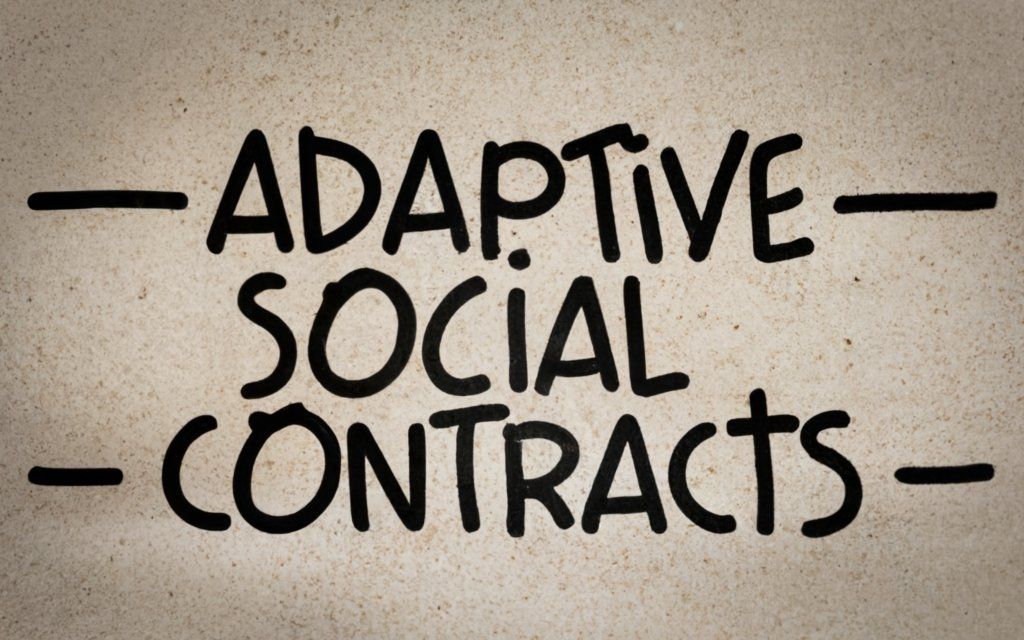In today's world of exponential disruption, the only constant is change. Companies must continually adapt and evolve to survive and thrive amidst uncertainty. However, enacting transformational change is notoriously difficult. Employees often resist changes that disrupt the status quo, especially when the rationale seems unclear. This resistance stems from an unconscious "psychological contract" that exists between different members—a set of unspoken expectations around job security, stability, roles, and more.

Yet, in times of disruption, clinging to the old psychological contract hinders progress. Organizations need a new paradigm—one of Adaptive Social Contracts as outlined by Enterprise Agility University. Adaptive Social Contracts are evolving agreements that enable continual adaptation. They establish shared mindsets, behaviors and commitments that support readiness, responsiveness and innovation despite uncertainty.
For change leaders and professionals, understanding and utilizing Adaptive Social Contracts is crucial for driving successful transformation. Here's why:
- They provide a unifying framework amidst complexity. They outline mutual expectations and shape a culture of agility even when specific change initiatives shift. This consistency and clarity is invaluable.
- They foster workforce empowerment and engagement. By involving employees in co-creating these contracts, they feel heard and valued. This intrinsic motivation enables them to take ownership of change.
- They enhance resilience and reduce change fatigue. With mutually agreed upon ground rules for flexibility, employees can weather storms without burnout.
- They enable continual realignment. As conditions evolve, social contracts can be renegotiated to meet emerging needs. This prevents stagnation.
- They smooth the implementation of specific changes. With a flexible and trustworthy culture already established, new transformations face less resistance.
In summary, Adaptive Social Contracts provide the cultural fabric for organizational flexibility and resilience during constant change. By co-creating and constantly and explicitly evolving these contracts, change leaders can secure buy-in for transformation, unlock potential, and build sustainable momentum. In turbulent times, understanding this paradigm is mission-critical.
Adaptive Social contracts are also a crucial part of Shared Progress.
Adaptive Social Contracts and the Three Universal Outcomes
Adaptive Social Contracts are strongly aligned with enabling the Three Universal Outcomes of Enterprise Agility—Always Ready, Always Responsive, and Always Innovative. Here are some key connections:
Always Ready:
Adaptive Social Contracts provide clear guidelines for readiness amidst uncertainty. By outlining mutual expectations and responsibilities, they empower proactive preparation.
Always Responsive:
Adaptive Social Contracts foster shared mindsets and behaviors for flexibility and resilience. This allows people to swiftly coordinate and adapt when priorities shift.
Always Innovative:
Adaptive Social Contracts encourage prudent risk-taking by ensuring psychological safety. People feel free to imagine bold new solutions and strategies.
Adaptive Social Contracts and the Universal Agreements
There are strong interconnections between Adaptive Social Contracts and the Universal Agreements in Enterprise Agility:
- The Right to Be Seen is upheld by involving all stakeholders in co-creating Adaptive Social Contracts. This conveys that everyone's perspectives matter in shaping guidelines.
- The Right to Be Heard is enabled by open dialogue during the formation of Adaptive Social Contracts. Mutual expectations are formed through listening.
- The Right to Be Empowered is reinforced by distributing authority through Adaptive Social Contracts. People shape priorities and processes.
- The Right to Be Part of the Group is satisfied by collaboratively developing Adaptive Social Contracts. The process fosters inclusion and shared identity.
The process of creating Adaptive Social Contracts models fulfillment of the Universal Agreements. Participative formation conveys respect and empowers people. This builds buy-in and intrinsic motivation to uphold these explicit and mutually evolving contracts.
In turn, embedding the Universal Agreements within Adaptive Social Contracts institutionalizes these mindsets. Contracts serve as living documents for guiding behaviors and norms based on the rights. They sustain freedom of expression, belonging, and empowerment.
These agreements become transforming forces by ensuring Adaptive Social Contracts are developed collaboratively and reflect the Universal Agreements. They realign relationships and systems to enable agility.
In summary, Adaptive Social Contracts and the Universal Rights have a reciprocal relationship. Contracts institutionalize the rights, while upholding the rights enlivens the formation of contracts. This synergy creates cultural foundations for continual learning and progress.
In essence, Adaptive Social Contracts establish the cultural fabric to handle complexity confidently. The evolving agreements shape norms of trust, transparency and accountability that underpin organizational dexterity. When social contracts remain fixed, people resist changing roles or approaches. But Adaptive Social Contracts enable continual realignment of responsibilities and priorities based on changing conditions. This prevents stagnation.
Finally, co-creating these contracts sparks engagement. By participating in shaping the guidelines, people gain ownership to enact them. This intrinsic motivation powers transformation.
Check more about Social Contracts and Enterprise Agility here.
